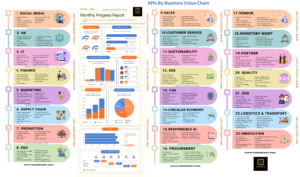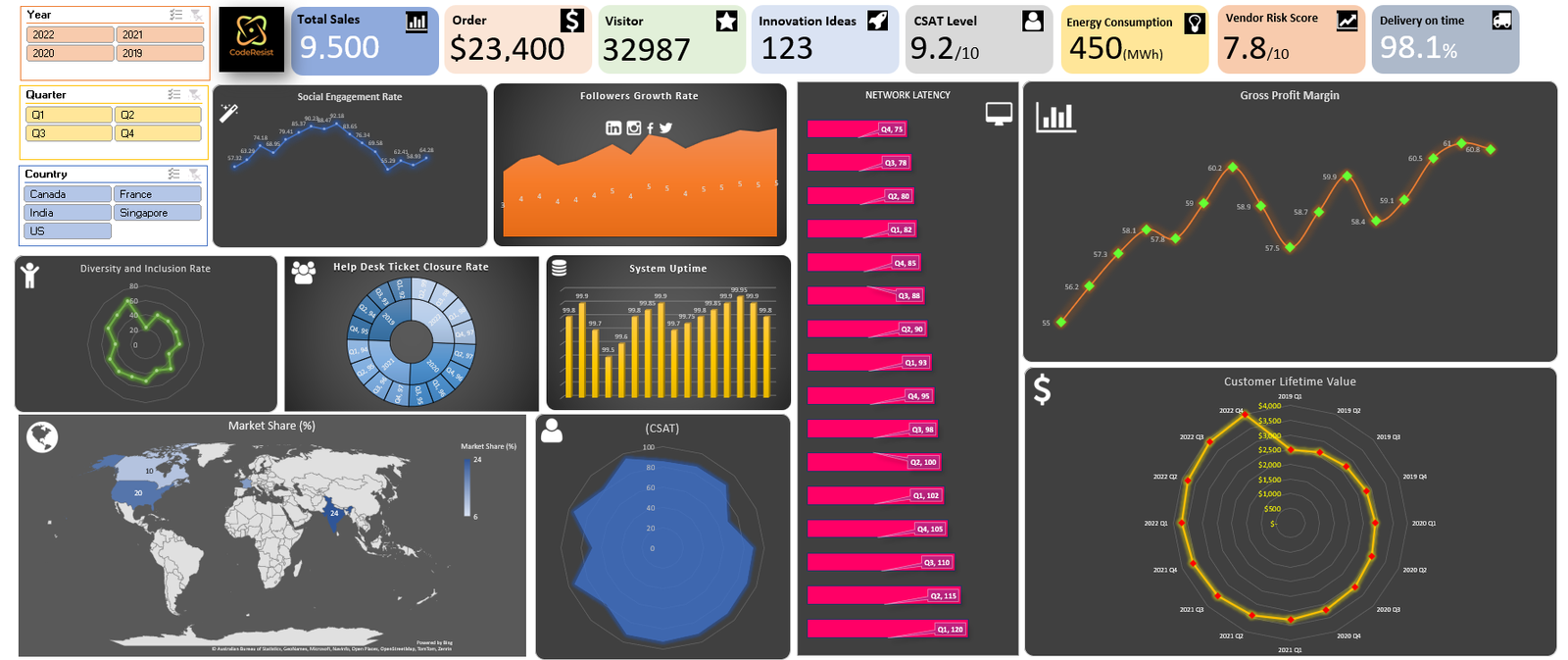Understanding the Power of Business KPIs: Essential Metrics for Every Industry
In today’s data-driven business landscape, Key Performance Indicators (KPIs) are more than just numbers on a dashboard; they are critical tools that help organizations track progress, optimize processes, and drive strategic decision-making. From total sales to system uptime, KPIs provide real-time insights that are indispensable for maintaining a competitive edge. This article explores the importance of KPIs across various industries, highlighting how they can be effectively used to measure performance and achieve business goals.
Challenges Associated with Managing Business KPIs
- Choosing Relevant KPIs: Identifying KPIs that accurately reflect business performance and align with strategic goals.
- Data Quality and Integrity: Ensuring the data used to measure KPIs is accurate, timely, and consistent.
- Integration Across Departments: Coordinating KPIs across different parts of the organization to avoid silos and ensure alignment.
- Adapting to Changes: Keeping KPIs relevant in the face of rapidly changing market conditions and business environments.
- Cultural Acceptance: Overcoming resistance from employees who may be wary of being evaluated by new metrics.
- Focus on Quantitative Metrics: Balancing the focus between quantitative metrics and important qualitative aspects like customer satisfaction.
- Analytical Complexity: Dealing with the complexities involved in analyzing and interpreting KPI data to make informed decisions.
- Balancing Objectives: Aligning KPIs with both short-term results and long-term strategic goals without compromising either.
- Consistent Monitoring and Follow-up: Regularly tracking KPI performance and implementing changes based on those insights.
The Role of KPIs in Business Success
KPIs by Business Value Chain: KPIs vary significantly by industry and individual business goals. For example, a tech company might focus heavily on system uptime and network latency to ensure optimal service delivery, while a retail business might track total sales, customer lifetime value, and social engagement rates to gauge market position and consumer interest.
Technology Sector
- System Uptime: Essential for assessing the reliability and efficiency of technology services.
- Network Latency: Critical for evaluating the speed and responsiveness of network infrastructure.
Retail Industry
- Total Sales and Customer Lifetime Value: These KPIs help businesses understand overall sales performance and the long-term value of customers, crucial for planning marketing and sales strategies.
- Social Engagement Rate: Indicates the effectiveness of social media campaigns and engagement strategies.
Manufacturing Sector
- Energy Consumption: A vital metric for measuring the efficiency of production processes and the sustainability of operations.
- Delivery On-Time Rate: Reflects the reliability of supply chain operations and can significantly impact customer satisfaction and vendor relationships.

Benefits of Monitoring KPIs
Data-Driven Decision Making: By continuously monitoring KPIs, businesses can make informed decisions that align with their strategic objectives. For instance, tracking the Gross Profit Margin helps companies adjust pricing strategies, manage costs, and optimize their product mix to enhance profitability.
Improved Operational Efficiency: KPIs like the CSAT (Customer Satisfaction Score) and system uptime provide actionable insights that businesses can use to improve service delivery, enhance customer satisfaction, and reduce operational bottlenecks.
Strategic Alignment Across Departments: KPIs ensure that different departments within an organization work towards common goals. By aligning departmental objectives with overall business KPIs, companies can ensure cohesive efforts towards growth and efficiency.
Implementing KPIs Effectively
To leverage KPIs effectively, businesses must:
- Select Relevant KPIs: Choose KPIs that directly align with specific business goals.
- Regularly Review and Update KPIs: Business environments are dynamic; regularly updating KPIs ensures they remain relevant and aligned with current business objectives.
- Educate and Engage Employees: For KPIs to be effective, employees at all levels should understand how their actions influence these metrics and, ultimately, the company’s success.
KPIs are indispensable tools in the arsenal of modern businesses. Whether it’s improving customer experience, optimizing operational efficiency, or driving financial performance, KPIs provide the insights needed to navigate the complex business environment and steer towards success. Companies that master the art of defining, monitoring, and acting on KPIs can enhance their decision-making processes, achieve strategic objectives, and maintain a competitive edge in their industries.










